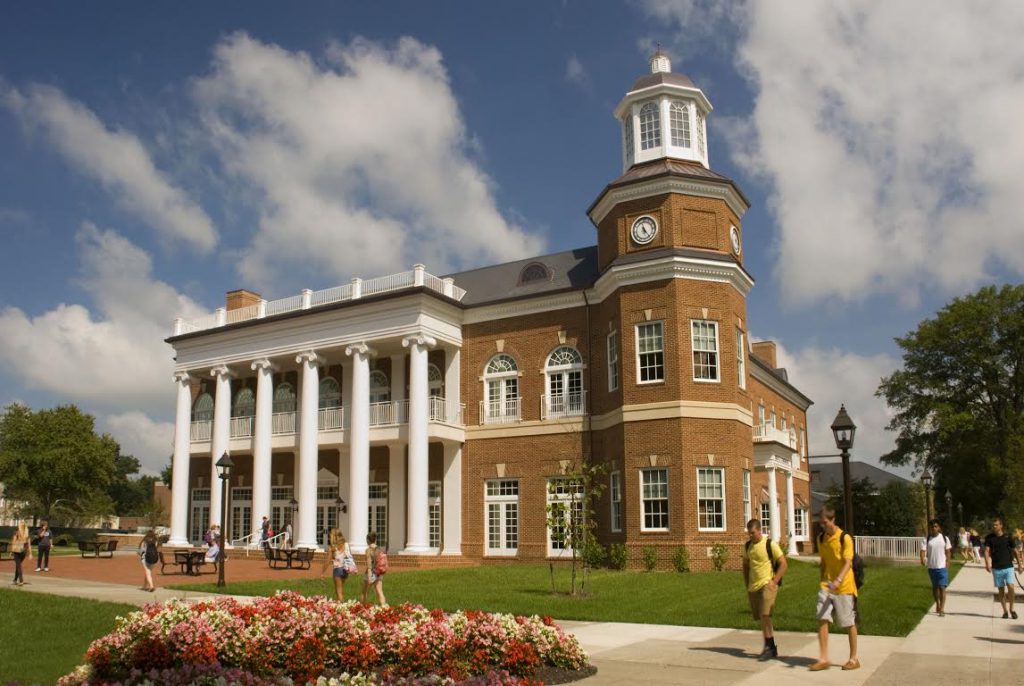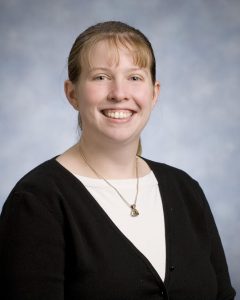
Randolph-Macon College is hoping to draw in more science students with a new scholarship. Photos courtesy of R-MC.
A program aimed at increasing the number of science teachers in Virginia has attracted the largest grant ever awarded to Randolph-Macon College.
The liberal arts and sciences college in Ashland has received a nearly $1.2 million grant – the biggest single grant in its history, the school said – from the National Science Foundation, a federal agency that provides funding for science research and education.
The five-year grant was awarded to April Marchetti, a chemistry professor and R-MC alum who is using the funds to start a new program to recruit, train and support teachers in chemistry, biology and physics.
Called The Randolph-Macon College Noyce Teacher/Scholar Program, the program will provide 16-18 full scholarships to R-MC students pursuing a major in one of those fields and a minor in education; yearly tuition at R-MC is $36,600, according to its website.
In addition to participating in STEM-specific instruction – curriculum focused on science, technology, engineering and math – recipients must agree to work in a high-needs school district for four years upon graduating and complete a summer internship or participate in a summer STEM camp for middle-schoolers.
Marchetti, who joined the R-MC faculty in 2001 after earning her bachelor’s degree there in 1997 and a doctorate from Penn State University, said the program aims to address a shortage of STEM educators across the state and the nation.
“We have a lot of STEM majors, but not a lot of them go into education,” she said. “When they graduate, all of the students in our program will be certified to teach chemistry, biology or physics at the secondary level. So we will be providing 16 to 18 new chemistry, biology or physics high school teachers by the end of this program.”
Marchetti said the program requires teachers to start at lower-performing school districts because those are the districts where STEM teachers are needed most.
“There’s a shortage of STEM educators, so they naturally gravitate to the more high-paying jobs in the more highly-rated school districts,” she said. “To be able to provide more chemistry, biology and physics teachers is something that’s really needed in our area.”
To that end, Marchetti – who is leading the program with fellow R-MC professors Diana Yesbeck, Traci Stevens and Rachele Dominguez – has reached out to several school districts throughout Central Virginia, including Richmond, Petersburg and Caroline County, to coordinate teacher placement, as well as student recruitment.
She said she’ll be visiting multiple high schools in January to promote the program to students who might be interested in the scholarship. She said the goal is to recruit at least six or eight students to start the program next school year.
The effort has also involved working with the Science Museum of Virginia, Lewis Ginter Botanical Garden and Maymont to provide 12-week internships, as well as R-MC’s education department to put on one-week science day camps for fifth-graders and middle-schoolers. The teachers-in-training must complete at least one of those internships or participate in a camp to satisfy the program’s requirements.
Marchetti said the local partnerships helped strengthen the school’s application for the grant, which it first applied for in 2013. The awarded application was its third attempt, she said.
“We really had to get a lot of people on board in order to put the whole thing together,” she said.
In awarding the grant, the NSF said the program responds to a call in 2010 by the President’s Council of Advisors on Science and Technology for more middle and high school teachers with majors in STEM fields.
“The Noyce program will attract students to careers in STEM education through targeted recruitment, with special emphasis placed upon recruiting underrepresented students,” the foundation said. “The local area encompasses multiple high-needs school districts…; these districts struggle to find qualified, certified STEM instructors.”

Randolph-Macon College is hoping to draw in more science students with a new scholarship. Photos courtesy of R-MC.
A program aimed at increasing the number of science teachers in Virginia has attracted the largest grant ever awarded to Randolph-Macon College.
The liberal arts and sciences college in Ashland has received a nearly $1.2 million grant – the biggest single grant in its history, the school said – from the National Science Foundation, a federal agency that provides funding for science research and education.
The five-year grant was awarded to April Marchetti, a chemistry professor and R-MC alum who is using the funds to start a new program to recruit, train and support teachers in chemistry, biology and physics.
Called The Randolph-Macon College Noyce Teacher/Scholar Program, the program will provide 16-18 full scholarships to R-MC students pursuing a major in one of those fields and a minor in education; yearly tuition at R-MC is $36,600, according to its website.
In addition to participating in STEM-specific instruction – curriculum focused on science, technology, engineering and math – recipients must agree to work in a high-needs school district for four years upon graduating and complete a summer internship or participate in a summer STEM camp for middle-schoolers.
Marchetti, who joined the R-MC faculty in 2001 after earning her bachelor’s degree there in 1997 and a doctorate from Penn State University, said the program aims to address a shortage of STEM educators across the state and the nation.
“We have a lot of STEM majors, but not a lot of them go into education,” she said. “When they graduate, all of the students in our program will be certified to teach chemistry, biology or physics at the secondary level. So we will be providing 16 to 18 new chemistry, biology or physics high school teachers by the end of this program.”
Marchetti said the program requires teachers to start at lower-performing school districts because those are the districts where STEM teachers are needed most.
“There’s a shortage of STEM educators, so they naturally gravitate to the more high-paying jobs in the more highly-rated school districts,” she said. “To be able to provide more chemistry, biology and physics teachers is something that’s really needed in our area.”
To that end, Marchetti – who is leading the program with fellow R-MC professors Diana Yesbeck, Traci Stevens and Rachele Dominguez – has reached out to several school districts throughout Central Virginia, including Richmond, Petersburg and Caroline County, to coordinate teacher placement, as well as student recruitment.
She said she’ll be visiting multiple high schools in January to promote the program to students who might be interested in the scholarship. She said the goal is to recruit at least six or eight students to start the program next school year.
The effort has also involved working with the Science Museum of Virginia, Lewis Ginter Botanical Garden and Maymont to provide 12-week internships, as well as R-MC’s education department to put on one-week science day camps for fifth-graders and middle-schoolers. The teachers-in-training must complete at least one of those internships or participate in a camp to satisfy the program’s requirements.
Marchetti said the local partnerships helped strengthen the school’s application for the grant, which it first applied for in 2013. The awarded application was its third attempt, she said.
“We really had to get a lot of people on board in order to put the whole thing together,” she said.
In awarding the grant, the NSF said the program responds to a call in 2010 by the President’s Council of Advisors on Science and Technology for more middle and high school teachers with majors in STEM fields.
“The Noyce program will attract students to careers in STEM education through targeted recruitment, with special emphasis placed upon recruiting underrepresented students,” the foundation said. “The local area encompasses multiple high-needs school districts…; these districts struggle to find qualified, certified STEM instructors.”

The STEM scholarship program that will begin at Randolph Macon College is fantastic. Cudos to April Marchetti !